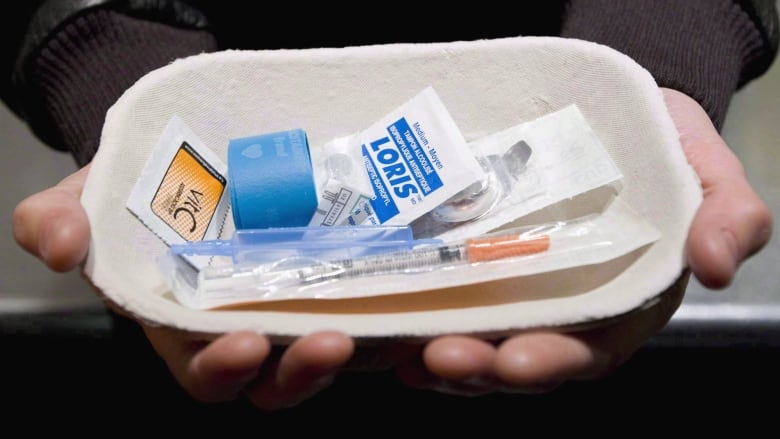Senate wants changes to Liberals' plans for new drug injection sites
Health Minister Jane Philpott must decide how to deal with amendments as cities await approvals

As the opioid crisis continues to killseveral Canadians every day, the Senate and a prominent doctors groupare at odds over a key part of the government's plan to save lives: supervised drug consumption sites.
But dealing with the Senate's proposed amendments to bill C-37 will mean delays to other changes in the legislation designed to support the Liberal government's new drug strategy and fight the opioid crisis.
Facing pressure to do more to help stem the tide of overdose deaths, Health Minister Jane Philpott pledged to make sure there were "no unnecessary barriers" for communities who want to step up supervised drug consumption sites.
Senate wants 3 amendments
However, the Senate has taken issue with parts of the minister's plan. Last Thursday, a majority of senators voted in favour of three amendments to the government's legislation:
- Setting a minimum number of days forpublic comment on a new supervised consumptionsite. The initial plan was to allow for a maximum of 90 days to allow the public to weigh in on any proposed site. The Senate's changes call for a minimum too: 45 days before consultation can be wrapped up.
- Giving the minister the option to set upa citizen advisory committee five to 10 volunteers who live near the site and who would providean annual written reporton issues including "public concern about the presence of the site in their community".
- Offering substitute pharmaceuticals to drug users. Senators argue this would discourage the sale of illicit drugs and reduce the risk of overdose.
Those amendmentswill now be sent to theHouse of Commons. Philpott will have to decide whether to recommend that the Houseaccept, reject or further amend them.
A decision to alter or reject the Senate's changes would put the legislation back in the Senate's hands.
Changes delay legislation
In any scenario, the fact that the Senate has asked for changes means the legislation will take a bit longer to become law. The House Leader's office says abusy schedule in the House of Commons means it's unlikely the amendments will be voted on this week.
- It's about to get easier for supervised injection sites
- 3 supervised consumption sites approved in Montreal
In the meantime, other parts of the government's plan to fight theopioidepidemiccan't be approved either. The same piece of legislation includes measures to make it moredifficult to import pill presses, in hopes of reducing the amount of illicitfentanylon the streets. It would also give theCanada Border Services Agency the power to open letter mail if an officer has reasonable grounds to suspect there is something prohibited inside.
Senator makes passionate case
Conservative Senator Vern White, who is also aformer Ottawa chief of police,made a passionate case in the Senate for offering substitute pharmaceuticals.
White described the substances being brought into supervised drug consumption sites as "a basement-made poison developed by a crime group for the sole purpose of making money off addicts" and said an addicted person "will often commit four, eight, 12 crimes on that day to be able to purchase that poison."
White said that the "replacement drug therapy" he was advocating for had been used in Switzerland and to a limited degree in other countries, and that it had led to a reduction of illegal drugs as well as associated crime.
Unnecessary delays?
The federal government brought in C-37 to make it easier for communities to get an exemption that allows themto operate a supervised consumption site. Under the old process put in place by the previous Conservative government, there were 26 criteria any new site had to meet. The proposed law sets out five criteria, based on a ruling by the Supreme Court.
Right now Health Canada has more than a dozen applications awaiting approval.
The Canadian Medical Association (CMA) doesn't like the Senate's proposed changes. The group representing Canadian doctors said they could lead to delays in getting new supervised injection sites approved.
We urge the gov't to reject the Senate amendments to #billc37 & allow its passage in its original form @janephilpott https://t.co/ZOWZHxn5Na
—@CMA_DocsThe Canadian HIV/AIDS Legal Network has also voiced its concerns in a letter to Philpott.
In addition to concerns about delays,it calls the potential citizen advisory communities "unjustified and excessive," arguing there are no similar requirements for health services for people who do not use drugs.
As for the call to offer drug users alternative pharmaceuticals, the group says that may be"well-intentioned" but could actuallycreate more problems.
Trust could be corroded
The letter argues that the relationship between the supervisor at the facility and the person going there to use drugs is based on trust, and that trust could be corroded if there is continued insistence on using a treatment the drug user does not want, which could "ultimately drive clients away from an urgently needed health service and contribute to additional disease, injury and death."
The CMA also takes issue with White's amendment, saying it is counter to harm-reduction practices, which call for accepting people where they are first and then gradually working with them on potential change.
It's not yet clear what the health minister will do. A spokesperson for Philpott's office says she will look at the Senate's amendments and decide how to respond.
With files from Susan Lunn













_(720p).jpg)


 OFFICIAL HD MUSIC VIDEO.jpg)
.jpg)



























































































